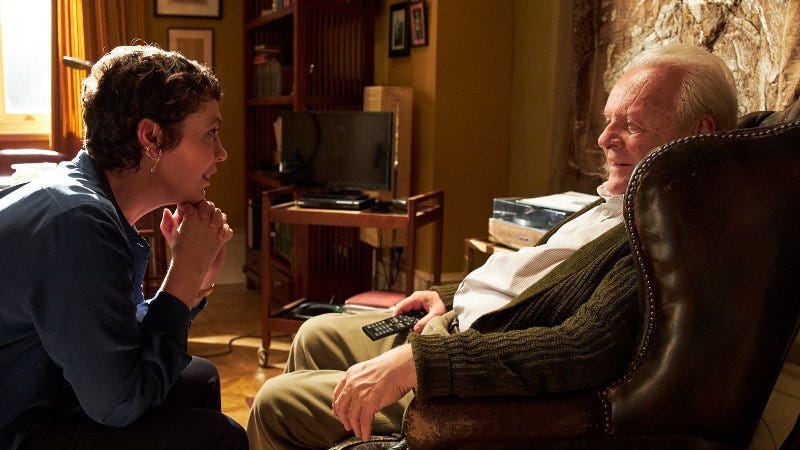The Father
A thoroughly engrossing and human look at the relationship between a man declining with dementia and the daughter taking care of him.
I confess I went into “The Father” without much enthusiasm. Dementia is a subject that’s been pretty well explored in cinema — “Supernova” is just one recent example — and I wondered how much familiar ground this film would tread all over again, even with Oscar winners Anthony Hopkins and Olivia Colman leading the way.
It took but a few minutes to replace my anxiety with astonishment. Director Florian Zeller, who adapted the screenplay (along with Christopher Hampton) from his own play, gives us a gripping tale that puts us right inside the mind of Anthony (Hopkins), an 83-year-old Londoner.
I don’t think I’ve seen a better cinematic depiction of mental illness since “A Beautiful Mind.”
The trick here is that we’re not witnessing Anthony from without, but seeing things through his eyes. To him, everyday life is a confusing journey in which strangers suddenly appear in your apartment, claiming to have known you for years, or strangers seem as old friends.
He also experiences agonizing time slips, so he’ll think it’s still morning when it’s suppertime — or even that he believes an hour has gone by when it’s been more than a month.
Colman plays his daughter, Anna, who has come to live with Anthony in his marvelous flat… or he has moved into her place, depending on his current mindset. Shockingly, Anna is sometimes played by another actress, Olivia Williams, and the pain on both their faces when he angrily denies her identity is a sight to behold.
This is a masterwork in acting by Hopkins, playing a proud man who’s desperately trying to put up a front of still being in charge of his own life. He’ll make a joke of his forgetfulness, charm the pants off whoever he’s talking to, then teeter off into a canyon of anger and despair the next moment. It’s an incredibly vulnerable performance.
Colman is solid too, playing a woman of middle years who has watched her own life flash by as she’s tended to her father in his decline. She lets us feel the mixture of shame, guilt, resentment and affection when she sees her father. Part of her knows a time is coming when he’ll need more care than she can give, but she’s not yet ready to let go of the responsibility.
At various times (from Anthony’s perspective) Anna is currently married, or divorced, or recently met someone and decided to move away to Paris. Rufus Sewell and Mark Gatiss play her lover alternately, whose patience for Anthony varies quite a deal, from kindly tolerance to outright abuse.
Imogen Poots turns up as Laura, a young caregiver who Anna has hired to look after Anthony while she goes away. He’s gone through a slew of such women who couldn’t take his abuse — for example, he’s constantly misplacing his watch but accuses his caregivers of stealing it. He’s immediately taken with Laura, who reminds him of his younger, favorite daughter: another reservoir of pain for Anna.
“The Father” falls into that small category films that can be painful to watch, but is extraordinarily rewarding for those that do. Such a beautiful, and very human, story.





